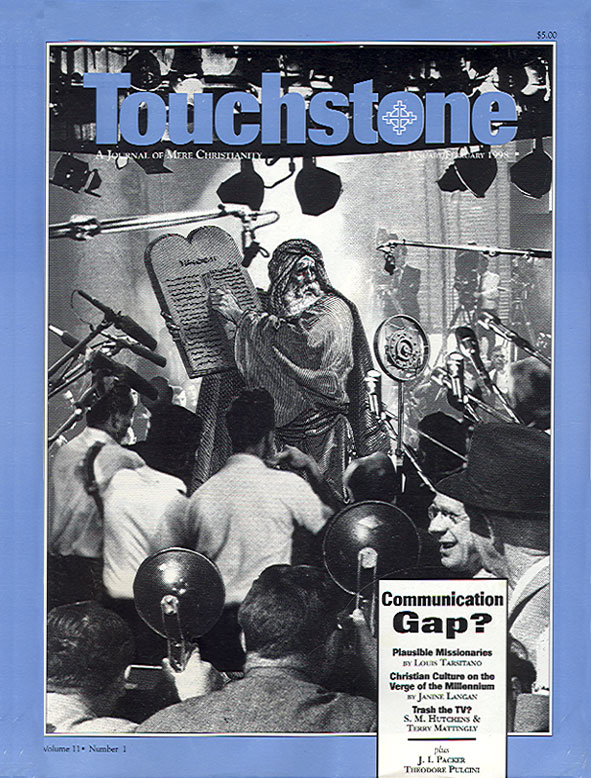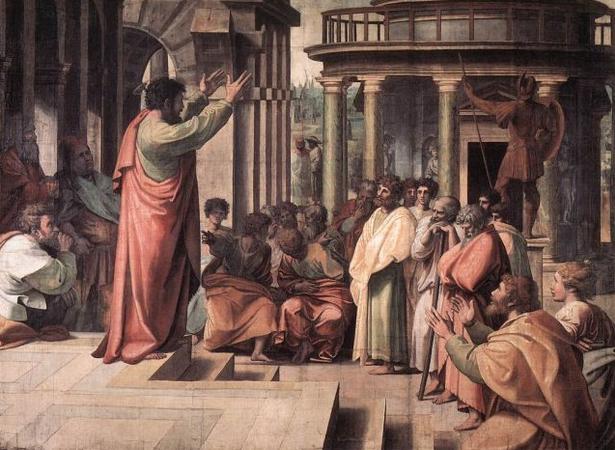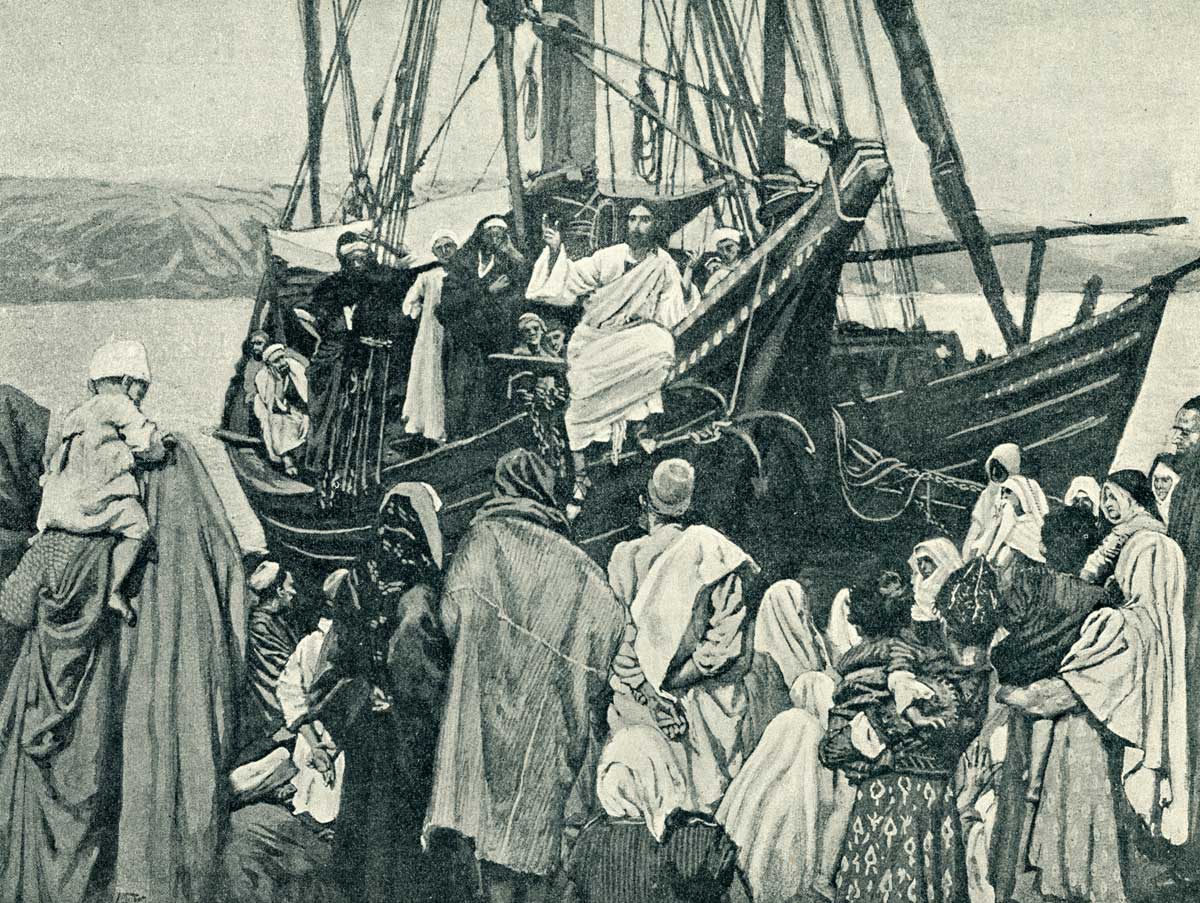The Culture of Hope & Glory
Passing on Christian Culture on the Verge of the Third Millennium
by Janine Langan
It is evident that passing on culture of any kind today is a major challenge. All over the world, people herald instead the creation of ever new societal patterns, cut off from any roots. Witness Chinese mothers spending half their weekly salary to take their precious single offspring to McDonald’s, so they feel at home in the new economy; or German academicians recreating the dictionary to erase all complexities in spelling, thus ensuring the impossibility of tracing words to their origin.
Four Cultural Handicaps
Here in North America, various forces combine to obstruct the transmission of culture from one generation to the next.
First, we lack the time. Recent Canadian statistics point out that children have lost 12 hours of parenting per week since 1960. Culture is lived, not thought. It takes time to digest and build it into one’s personal make-up. And time we don’t seem to have, neither we nor our children. A great Puffin book, Michel Ende’s Momo, recounts the almost successful war against children of smoky-grey time thieves attempting to take over the world, sucking us dry of “presence.” It sounds eerily true. How will children learn to rejoice in the gift of life and in their responsibility for co-creating the universe, if their parents never took the time to cook and garden with them? Without regular family meals and the related festivities, how will they learn to throw themselves heart and soul into liturgy? All our later ideational teaching must be grounded in such real life experiences. If not, our words will flash for an instant, then wither and die.
Second, any cultural transmission must counteract the formative impact of the new media, from TV to computers. TV killed reading and storytelling for many children. At key developmental times, it replaced complex tales with bits of strong input fitted to the young’s presumed “attention span,” thus ensuring that this attention span would not be stretched. Generations raised on “Sesame Street,” cop chases, and porn videos do not think in terms of long-range plots; they crave for the fastfood imagination instead. They do not experience themselves as part of a long, complex history, going somewhere. Alasdair McIntyre rightly points out that this makes the transmission of serious ethics almost impossible. Transmitting Christian culture means essentially inserting a new person into Christ’s transfiguration of history. But for much of the new generation, history, meaningful story, is not a concept. And it is in no way linked to their own life story, which is itself perceived either as a passive victimization, or as a chance privately to actualize one’s internal gods and demons (c.f. the popularity of Thomas Moore’s Care of the Soul).
As for the Internet, it gives one a chance to communicate without commitment or risk of any kind: a totally disincarnate form of communication. Here, one’s interlocutors have no access to any concrete, betraying trace of one’s person: neither facial expression nor voice, nor even handwriting. This is one of the attractions of virtual reality. I have a friend who is very fat, and loves to chat on the Internet as “gazelle.”
Third, and I think most problematic of all, the new generation is deeply mistrusting. They have been showered since their earliest years with warnings not to allow adults to come too close, either because they are potential sexual molesters, or simply because they are parents threatening to distort their budding identity (this was the common topic of conversation among teachers at our intermediate, yuppie public school). Early exposure to the harshness of sex has also left them wounded by first experiences of “love,” whether their own or their friends. And they are constantly aggressed by the overstimulation of various media. One of my students said it graphically, in response to my complaints that her class was almost unreachable, even by shock techniques: “Shock is counterproductive. We are the condom generation. We know how to shield ourselves from outside invasion.” Transmission of culture is based on trust, and generous self-opening to new experiences. That trust is simply not there. Political correctness has been successful in forming us all: we believe in the right to privacy and in the ultimate value of tolerance. Both express the same rejection of insemination with the insights of others; cultural transmission is precisely such insemination.
Fourth, virtual reality is the passion of the new generation. They love simulation, and the stimulation that it entails. A movie without special effects is of no interest. Christian culture is about presence and truth. It is an effort to reject escapism into myths and fantasy, and to transform the real world into a proper offering to our Creator, a true temple of the Spirit. The general rejection of the institutional church, in other words, of the Church incarnate and tangible, is a logical effect of this preference for special effects over tough daily reality and its overwhelming demands.
Can approaches be found to break through so many fundamental impediments to the transmission of Christian culture in the present society? One of John Paul II’s latest apostolic letters, Tertio Millennio Adveniente, will be my source of answers to this question. This pope is the most culture conscious and mission conscious of all popes, and his universal call to join in celebrating the 2000th anniversary of Christ’s birth is clearly his latest ploy to lure the world at large into Christ’s way of life—into participating in Christian culture. His attempt to focus our attention on the millennium is an attempt to counteract the cultural handicaps in ourselves; it intends to prepare us to deal with them in others. Here then are a few general pointers from Tertio Millennio Adveniente (TMA).
Culture as Necessary Vessel
First, why should we care? Why attempt to transmit Christian culture to people who could not care less? Why not simply enjoy our heritage, and give up on others who are obdurate? Simply because transmission is what Christian culture is about. It is about molding any culture into an instrument through which God’s presence can be experienced by all; it is about transforming any community into a place where all people can participate in his wonderful life. What we will celebrate in the year 2000 is not the birth of a great idiosyncratic culture. It is the coming of the God of the universe into his own world. Our cultural objects do not “push the Christian God,” as one of my students recently put it. They are intended to enable humanity to encounter the God of all. Every man and woman has the same right as we do to encounter traces of God’s presence, to hear his call. Woe to us if we fail our brothers and sisters out there by hesitating to use Christianity’s cultural achievements to this end. Woe to us if we do not fight the disinformation that blocks thousands from accessing them.
Christian culture is a vessel for the water of life, not a collection of museum treasures to be saved and hoarded. Drunk with this water, early Christians tended to ignore the vessel, and to consider themselves “cultureless,” and pagans despised them for this lack of forms; witness the Letter to Diognetus. Eventually, the rejection by others of the cultural forms that Christians were unconsciously generating forced them to become interested in Christian culture; this is evident in writers like Minucius Felix or Clement of Alexandria. Any Christian cultural form is useful only insofar as it expresses the Spirit. Awareness of this truth is vital to any valid Christian education.
If we remember that the cultural patterns we propose are not our private treasure hoard, but are part of God’s ongoing flooding of the world with his presence, and mankind’s birthright, our very teaching techniques will change.
Courtesy & OpennessThe pope’s approach to his readers in Tertio Millennio Adveniente is a lesson in courtesy. He capitalizes on existing cultural trends, and harnesses them to his countercultural purpose. No overwhelming debating techniques are needed. The pope carefully brings out the truth latent in his reader’s cultural assumptions and baptizes them, leading his interlocutor both to rejoice and to repent. This is an art many Catholics do not possess.
The need for a universal religion, for example, is a basic contemporary and New Age theme. The pope reminds us that it has always been central to Christianity. The birth we celebrate, he points out, “is the fulfillment of the yearning of all the world’s religions . . . the recapitulation of everything” (TMA, 6).
Or again, gurus everywhere, including computer theorists, offer new methods to access a transcendental, divine form of life. Like Paul, this pope responds Et plus ego. “Man is the epiphany of God’s glory, called to live by the fullness of life in God” (TMA, 6). “In this consists the religion of ‘dwelling in the inmost life of God’ which begins with the Incarnation of the Son of God. The Holy Spirit, who searches the depths of God, leads us, all mankind, into these depths by virtue of the sacrifice of Christ” (TMA, 8). To a public starving for spiritual experience, he does not present Christianity as a superior system of laws, nor a sublime philosopher’s idea, but as access to Eternal Life. We stress the importance of presenting Christianity’s impact on all branches of culture, in our Christianity and Culture program, for this very reason. All reveal Christ’s claim and transforming impact on a person’s whole life, the integral unity of our mission, which is not just transmission of words, but incarnation.
We might have lost fewer people to various sects had we always kept in mind this central truth about Christianity. “God became man, so that man could become God.” This statement of Athanasius, so often quoted by the pope, shocks most young Catholics. They have never heard of this radical total dimension of Christianity—so ancient and so new.
Christian culture is astonishingly open to syncretism, properly understood. Witness the early Church Fathers. We do not read these Fathers enough: their works brim with the excitement of our faith, when it was still young and perceived as the long-awaited answer to man’s quest for joy. They are superb models of how Christian culture is transmitted, creatively, to foreign people and in times of cultural crisis.
Make no mistake; this courteous approach the pope and the Fathers teach us is not wishy-washy syncretism. Pointing out that Christianity responds to our common human spiritual yearnings is but a prelude to transmitting its unique insights: above all, the shocking news that on our own we cannot acquire the divine life we long for, and that God therefore seeks man out, through Christ. What is unique in the contribution of Christian culture must be the central content of our teaching. New Age is the groping expression of a very valid thirst, which we all know; Christians are asked to broadcast God’s unexpected, realistic response to that thirst. Which is why our program seeks out, in everyone of its manifestations, the “essence” of Christianity; the root vision which all of its manifestations attempt to transmit.
A Culture of Advent
It is not enough to recognize that we cannot keep Christian culture to ourselves. Given the lack of time and preparation that our students have, it is essential to decide what aspects of it we should present, so they exit the program with real guidance for life. How can focus be given to a program, the project of which covers the best of two millennia of cultural activity, and explores all fields of human endeavor, from art to technology, from philosophy to institutions and politics? Is it not doomed to end up as an eclectic smorgasbord, with the worst faults of previous Great Books programs?
Tertio Millennio Adveniente gives us an interesting suggestion. The pope capitalizes on this Jubilee of the Nativity to remind us that Christian culture is an “Advent” culture. Pointing to a “new Advent,” he adds, “has been a hermeneutical key to my pontificate” (TMA, 23). The Church’s mission is to herald this new Advent, the coming regeneration of the world by the Spirit, Dominum et Vivificantem (the title of one of John Paul II’s central encyclicals). Our cultural treasures are simply tangible responses of individuals and communities “to all that the Spirit is saying to the Church and to the Churches” (TMA, 23).
There’s no Christian culture without charisms. No successful transmission of it unless the inculturated person’s ear becomes more sensitive to the Spirit’s promptings. Christian culture is a vessel from which revelation flows to the world at large, or else it is nothing, mere straw, as Aquinas put it. Hence, reciprocally, the vital importance of our cultural efforts: “Despite appearances, humanity continues to await the revelation of the Children of God, and lives by this hope, like a mother in labor”(TMA, 24).
We must help others trace Christ’s impact on real history, past and present, so they can taste and see the goodness of the Lord; and so that they can find meaning in life through participating in the continuation of this history. Early French literature narrates gesta Dei per Francos, the great feats of God through the Franks. They were my initiation into wonder and mission.
Flawed VesselsThere are on earth no perfect or final vessels for God’s presence. All cultures are flawed, and nothing fails like success. Even Gothic cathedrals can feel like albatrosses around one’s neck, as life forms change with the times, and tourists make exposition of the Blessed Sacrament almost impossible. And human pride lurks in every work of glory. No culture lasts forever, destroyed as it must be by its own limits. As Dawson brilliantly showed, Christianity lives eternally; its cultural forms thrive for awhile, then pass away. There have been many Christian cultures, and there will be many more. This must never be forgotten when transmitting the cultural feats of Christians. Triumphalism is to be avoided; so is crisis mentality. Christianity is always in crisis; the Church is semper reformanda. From every cultural failure, from every moment of decadence, we fully learn our inadequacy to respond to Christ’s call. It is easier to teach repentance from past errors than from present failures, which we often find too painful to contemplate. The study of Christian culture should help train us in true humility, make us more lucid about the distance between our goal and our actual progress.
Thus, when exploring the glory and the limits of man’s cooperation with the Spirit through Christian culture, our central aim should be to awaken a cynical generation to the excitement of history, for history is the stage on which God and man encounter. Most religions attempt to flee time. Our contemporaries deny meaning to history. Christians, by contrast, know that “man is called to achieve fulfillment in the course of a single earthly existence, in God who comes to meet him here through his eternal Son” (TMA, 9). Hence the importance for us of culture, God’s stamp on time through man’s action. “It is our duty to sanctify time.” Christian culture calls for rejoicing in the times in which we live, for “the day of salvation has come, ‘the fullness of time.’ In Jesus . . . time becomes a dimension of God” (TMA,10).
This has two implications. First, teach respect for time: “Each measurement of time is imbued with the presence of God and with his saving activity” (TMA, 16). As the Easter liturgy proclaims, “Christ yesterday and today, . . . all time belongs to him, and all the ages, to him be glory and power through every age for ever.” It is ironic that the secular world itself should measure its own progress by the event that launched Christianity. All humanity today explicitly recognizes the coming of Jesus as our universal point of reference, as the moment that launched our “common era.”
Second, challenge everyone to take on Christian culture as a personal project, for the glory of God and the salvation of those who do not know Christ. Each of Christianity’s achievements, whether it be institutional, intellectual, technical or artistic, can serve as role model, as a pointer to our own present mission, even if it has long ago become obsolete. For each of these shreds of evidence makes accessible a moment of cooperation with the Spirit. Each is an example of how that kingdom is brought about, where every person will find his or her unique creative role, and where humanity will rejoice as one in the Lord’s peace.
The Eschatological WitnessOf all the comments from former students of Christianity and Culture, this is the most common: “The faith you teach has a place for us as individuals, it has exciting practical implications.” This generation is finding it ever harder to find its place in the active life of the society: “There are no jobs” means “We don’t need you.” Christianity has a job for everyone. It calls us all to become “subjects of history.” Marxism here has nothing on Christianity, and neither do the sects.
What gives coherence to our efforts to transmit Christian culture? What incites a healthy combination of rejoicing and repentance at our human endeavors, fostering not only awareness of what has and can be done with Christ, but also bringing into sharp light the limits and flaws of each of these feats? All of this can be summed up in one phrase: the eschatological perspective. To launch anyone on the “journey to the Father,” Christian culture must be seen as proposing a vision “of the final goal which gives meaning and value to life, offering solid and profound reasons for a daily commitment to transform reality in order to make it correspond to God’s plan” (TMA, 46). Reciprocally, eschatological vision alone gives our cultural efforts their proper proportion; it clarifies what “authentic conversion” is still demanded of us, and thus calls to repentance.
But eschatology is precisely what contemporary culture opposes in every way. Our students, as we saw, live in the instant—and eschatology introduces them to a historical project launched at creation and ending in eternity. They trust no one and protect their privacy and freedom. Eschatology demands that they become instruments of the Spirit, as it draws all human beings into communion with divine life. They flee from quiet contemplation into mere activism. We want them to join in contemplation of the splendor of Christ’s work, to enjoy the firstfruits of the Spirit, to taste peace in the presence of God with us, here and now. They try to escape from daily incarnation into virtual reality, preferring simulation and stimulation to investment in harsh reality. We want them to listen to the signs of the time and to commit to practical kingdom building.
This has two implications. To think eschatologically is precisely what they need; it would help heal some of their worst problems. And we ourselves have not done a very good job of giving living witness to the eschatological dimension of reality.
Why is this?
Millennial SicknessFirst, most of us do not wish to focus on the millenary dimension of Christianity. Millennialism is a dirty word among intellectuals, Christians included. We have been conditioned to being ashamed of thinking eschatologically. Cohn’s brilliant The Pursuit of the Millennium (N.Y.: Oxford Press, 1970) has become a standard reference for those whom the millennial vision upsets. And Teilhard de Chardin is the bugaboo of conservative Christians. Critics such as Sweet (1979), Bettis (1984), and more recently Meissner (1995), a Jesuit professor of psychoanalysis, are at pains to make us “confront the polarizing tendency in” eschatological thinking and recognize “that [it] is the product of mental aberration and psycho-social disorder” (Sweet, 1979, p. 512).
If one examines how these critics define millenarian thinking, one will soon realize that the Gospels can easily be classified as products of such thinking. Take Cohn’s five points, for example. Millennialism is:
(a) collective, in the sense that it is to be enjoyed by the faithful as a group; (b) terrestrial, in the sense that it is to be realized on this earth and not in some otherworldly heaven; (c) imminent, in the sense that it is to come both soon and suddenly; (d) total, in the sense that it is utterly to transform life on earth so that the new dispensation will be no mere improvement on the present but perfection itself; (e) accomplished by agencies which are consciously regarded as supernatural (Cohn, 1970, p. 15).
Most of these beliefs, if properly interpreted, are central to the message of the Church since its beginning, and its enemies do not hesitate to point this out.
Contemporary secular ideology is diametrically opposed to the vision of the kingdom. In its eyes, desire for sainthood is elitist. Hope for the millennium leads to hatred of present society. It is a narcissistic ideal, an idealization of the Ego implying projection of evil onto others, and eventually abolition of the superego. It unleashes a kind of destructive aggressiveness, so obviously manifested in the Crusades. Giving oneself over to God as his instrument leads to Nazi-like rejection of personal responsibility. At best, it is a symbolic, illusory belief system. If protected from “the pathological distortions and fetishistic contamination of fanatical desire,” and “maintained in the perspective of reasoned hope and authentic faith, [it] can serve the function of sustaining and strengthening resources that make human existence meaningful if not bearable” (Meissner, 351). Thus ends Meissner’s book. No wonder our students do not flock to adopt such millenarian symbols as food for life.
Mere Fantasy or Incarnation?Fantastic forms of “millennial thinking” are indeed dangerous. Christians have long contrasted chiliasm with true eschatological faith. Such discrimination is obviously vital. True hope “does not suppress or skip the unpleasant realities. . . . Guilt remains guilt and suffering remains suffering, even for the believer, a cry to which there is no ready-made answer. Faith does not overstep these realities into a heavenly utopia, does not dream itself into a reality of a different kind,” as Moltmann puts it (Moltmann, 1967, p. 19). It is vital that we keep this distinction in mind if our eschatological project to transmit Christian culture is to bear fruit. This is precisely why the pope links repentance so tightly to rejoicing in his Tertio Millennio Adveniente: Hope is a sense of the presence of God at a distance. Which is why Augustine heralds hope as the earthly virtue par excellence, the catalyst of our best work, and our most proper form of joy.
But today, it is not chiliasm but eschatology itself that is in trouble: our very faith in Christ’s coming is being put down. Meissner makes it clear that, to him, millenialism and eschatology (i.e., both reasonable and mad visions of the kingdom) are simply two elements of a single “paranoid construction” to be nurtured because they are of great potential psychic utility. Such “hopeful illusions sustain life and increase the measure of tolerance to human existence” (Meissner, 349).
We must not only counteract such devaluation of humanity’s most precious yearning into narcissistic or sado-masochistic activity, but also into healthy psychological gymnastics. We must not allow this blasphemous perception of God’s central promise as mere fantasy to keep spreading.
What our students need from us is an antidote to the desolation of narcissistic pleasure-seeking and pain avoidance, of that untrusting solitude in which they imprison themselves. Christian culture, understood as transmission and partial realization of Christ’s eschatological promise, is such an antidote: It helps draw us from the realm of fantasy to that of concrete truth and love in action, here and now, before time runs out.
What the millennium is about is what Christian culture is about: participating in God’s incarnation. God is with us; God wants us as co-creators. Christian culture is nothing but the herald of this millenary Truth. If we believe this, and act accordingly, we will know how to transmit it.
Rejoice, Repent & Behold
Unless it generates excitement in the coming of the kingdom, in Christ’s transformation of this world into a place where freedom and equality thrive, we will have failed in our attempt to transmit Christian culture. Jubilees exist to remind us of this project of God for us, in which is rooted the social doctrine of the Church. The pope’s advice on preparing ourselves for the upcoming Jubilee is thus advice on preparing ourselves to transmit Christian culture.
His advice:
First, learn to rejoice in what the Spirit has already done for the world. Learn to give thanks “for the gift of the church, sign of intimate union with God and of the unity of all mankind”(TMA, 32). Invoke the Spirit “with ever greater insistence, imploring from Him the grace of Christian unity” (TMA, 34). I think nowhere do we sin more grievously, we Christian educators, than in our failure to love the Church, to praise the glorious presence of the Spirit in it, and to thirst for the union of all mankind in it. Is it excusable that only three of my students in a class of fifty had ever heard of Jean Vanier, when we live only ten miles from his Daybreak community? Is it excusable that they never grieve over the fact that most of their colleagues do not know the joy of belonging to this Church?
Yet, how astonishing is the cultural impact of Christian institutions, imagination and theory on humanity today! Even political correctness, which holds so much of the world in its sway, mostly pushes Christian insights, for which 2,000 years ago one would have been either executed or considered insane.
If we want to reach our youth, we must learn, ourselves, to rejoice in what the Spirit is doing. Let me quote the pope on this point:
There is need for a better appreciation and understanding of the signs of hope present in the last part of this century. . . . In society in general, such signs of hope include: scientific, technological and especially medical progress in the service of human life, a greater awareness of our responsibility for the environment, efforts to restore peace and justice wherever they have been violated, a desire for reconciliation and solidarity among different peoples. . . . In the Church, they include a greater attention to the voice of the Spirit through the acceptance of charisms and the promotion of the laity, a deeper commitment to the cause of Christian unity, and the increased interest in dialogue with other religions and with contemporary culture (TMA, 46).
While the first preparation exercise is thus to love the Church, the second is to repent with the Church. For “the Church . . . is at the same time holy and always in need of being purified, pursuing the path of penance and renewal” (TMA, 33). And this applies to those of us who wish to help transmit her culture. Not only is repentance a spiritual necessity for us teachers, it is also a practical one. Triumphalism does not work. Hypocrisy repels. We must stop hiding our errors, and recognize them publicly for what they are: murderous sources of scandal that have kept others unnecessarily from encountering Christ. We Christians have often “failed to show the true face of God.” We mar that face through our intolerance, our violence, by being exploitative, or simply mistaken or uninformed, time and again. Let us recognize it, understand what leads to such errors, apologize for them and redress them wherever possible, vowing never to repeat the same mistakes. We will be astonished at the effect of such honesty on our interlocutors.
What is the root of our counter-witness? Deafness to the Spirit’s promise. How often do we teach Christian culture, forgetting that its end is “the unity willed by God for his People” (TMA, 34). Hence “our infidelities, inconsistency and slowness to act” (TMA, 33). We lose focus on our end, which is the end of all mankind: common participation in the life of the Trinity. What we are called to pass on, through Christian culture, is belief in, hope for, and love of that end—and not primarily that heritage for its own sake, however lovely, however heroic. Christian culture is simply a sign, a sacrament of that promised end.
Our students’ hangups, religious indifference, loss of the sense of our transcendence, disinterest in Truth, all reflect this fundamental failure of ours. The hardness of heart of our interlocutors is an instinctive reaction to our own loss of contact with the Spirit present in us, in revelation and in the Magisterium; to our lack of anguish at the injustice suffered by others; to our lack of respect for the charisms of others; to our weak commitment to witness beyond the Catholic stronghold. Our teaching is dulled by our failure to bask in that “cloud of glory” in which God wished to clothe himself, the communio sanctorum, witnesses from every denomination; a glory that already “speaks louder than the things which divide us” (TMA, 37) about the Lord’s presence among us. We are emasculated by our fear of the variegated vitality of the local Churches, the beautifully multi-colored coat of Christ our King. We do not “look saved” enough, as our opponents put it. In a word, we do not radiate hope in the Promise, faith in the tangible presence of the Spirit, or that love which it is our mission to spread.
Third, rejoice, repent, but, above all, look on your God. Ecce natus est nobis salvator mundi. This is the Truth Christian culture exists to proclaim and demonstrate (TMA, 38). Meditate on that Truth. The virtues needed to transmit Christian culture can only be acquired by contemplating that Trinitarian life that it exists to signify. They are fed by “intense prayer and solidarity with one’s neighbor” (TMA, 42), and by ever deeper involvement in the Church’s sacramental life. Baptism in Christ is the source of our faith; confirmation in the Spirit, the source of our hope; return in penance to the Father, the source of all charity.
The Light that ShinesChristian culture is but a pointer to God, our source and our End, and in “the significant and lapidary words of the First Letter of John: ‘God is love’”(TMA, 44). “In the evening of life, we will be judged on love” (John of the Cross, Words of Light and Love, 59, quoted in the Letter to Families, 22). As Augustine so beautifully taught in De Doctrina Christiana, there is one standard for reckoning the success of any effort to transmit Christian culture: Charity. Our cultural mission work will be judged by our concern for the salvation of every person; by our attempts to concretize this passion in a worldwide “civilization of love,” peace, freedom and dignity; by our dedication to mankind’s destiny, “union in the light of Christ, image of the unseen God, the firstborn of every creature” (TMA, 59). This union must begin at home, in our single-minded personal longing for it.
We Christian educators do not have a ready-made garden of delights to offer. But we have a treasure of “sacramentals” to transmit; an array of “spiritual exercises” through which to prepare for life in God; and traces of Christ’s presence among us magnificent enough to inflame any heart. We are not asked to teach history, past and present, because whatever is, is right. We are asked to look there for the road to the Father that Christ keeps tracing for and with us; and then to point it out to others, through the best of the work of our forefathers.
Our job is not to teach facts or answers but to provoke encounters that will enlist our students in the mission their predecessors in the faith accepted. We will have succeeded if, through real contact with the best of our culture, we teach the young not to “cease to put questions to Christ: to meet him and then keep searching for him in order to question him further” (TMA, 58). Should we succeed in this, “they too will have the joy of making their own contribution to His presence in the next . . . centuries, until the end of time” (TMA, 58). And our joy in the Spirit will be watching them, and learning from them in turn.
Tertio Millennio Adveniente proposes one of the most beautiful images for Christian culture. I close with it:
Seen in this light, the whole of Christian history appears to us as a single river, into which many tributaries pour their waters . . . We gather with renewed fidelity and ever deeper communion along the banks of this great river: the river of Revelation, of Christianity and of the Church, a river which flows through human history starting from the event which took place at Nazareth and then at Bethlehem two thousand years ago (TMA, 25).
May God help us help our students, our children, to see reality in this light, and to gather with all mankind along the banks of this wonderful river.
Janine Langan is Associate Professor of Christianity and Culture at the University of Toronto, a program she founded eighteen years ago at St. Michael’s College. She has written and lectured extensively on the media, art, the family, and the problems of Catholic education. This article was first given as a talk for “In the World—The Gospel of the Resurrection in a Culture of Death,” sponsored by Touchstone and the Fellowship of St. James in August 1996 in Chicago, Illinois.
subscription options
Order
Print/Online Subscription

Get six issues (one year) of Touchstone PLUS full online access including pdf downloads for only $39.95. That's only $3.34 per month!
Order
Online Only
Subscription

Get a one-year full-access subscription to the Touchstone online archives for only $19.95. That's only $1.66 per month!
bulk subscriptions
Order Touchstone subscriptions in bulk and save $10 per sub! Each subscription includes 6 issues of Touchstone plus full online access to touchstonemag.com—including archives, videos, and pdf downloads of recent issues for only $29.95 each! Great for churches or study groups.
Transactions will be processed on a secure server.
more on culture from the online archives
more from the online archives
calling all readers
Please Donate
"There are magazines worth reading but few worth saving . . . Touchstone is just such a magazine."
—Alice von Hildebrand
"Here we do not concede one square millimeter of territory to falsehood, folly, contemporary sentimentality, or fashion. We speak the truth, and let God be our judge. . . . Touchstone is the one committedly Christian conservative journal."
—Anthony Esolen, Touchstone senior editor












